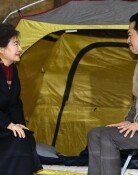85%, Serious Conflicts between Social Groups
85%, Serious Conflicts between Social Groups
Posted August. 12, 2003 21:36,
A vast majority of Koreans reportedly believe that discord between different social groups has reached a critical level, with the gaps between the haves and have-nots, and the conflict between labor and management being of the utmost concern.
In anticipation of Liberation Day, which falls on August 15, the Donga Ilbo newspaper surveyed 1,044 people across the nation Monday on the current state of social cohesion in Korean society. About 85.3 percent of the respondents said that conflicts between social groups are very serious, while just over half, or 50.7 percent, said that the conflicts are getting worse.
According to the survey, people said that they were also worried about generational gaps (8.7%), hostility between different regions (9.8%), ideological conflicts (14.8%), gaps between the haves and have-nots (37.9%) and labor-management conflict (24.7%).
Some 59.0 percent of the respondents attributed these conflicts in Korean society to politicians and political parties, while 34.7 percent of them pointed out that for social cohesion, politicians should not instigate or take advantage of conflicts.
With regards to how the Roh Moo-hyun administration, which will have been in office six months on August 25, has handled national management issues, 50.1 percent responded negatively, up from 28.1 percent in a May 25 survey.
In particular, 69.5 percent of respondents thought that the new government is handling economic issues incorrectly. In addition, 63.1 percent felt that the current economic situation is worse than when the Asian financial crisis hit the nation in 1997-98.
In terms of popularity of parties, the ruling Millennium Democratic Party (MDP) got the highest approval rating (23.8%), followed by the Grand National Party (21.4%), the Democratic Labor Party (4.0%), Peoples Party for Reform (2.6%), and the United Liberal Democrats (0.7%).
The survey was conducted by the Korea Research Center by phone. The survey has an error margin of plus or minus 3.1 percentage points with a 95 percent confidence level. More information concerning the survey can be accessed at www.donga.com
sunny60@donga.com







